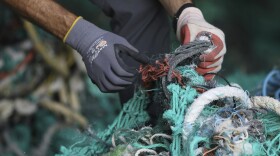It’s been just over a year since the threat of COVID-19 began to change the way Hawai?i residents work, learn, and travel. Here's a snapshot of how the pandemic has impacted some of the state’s most remote and rural communities.
It was around this time last year that Moloka?i resident and mother of three Kui Adolpho realized COVID-19 was not going away any time soon.
“We were supposed to go to Reno and take our kids snowboarding. So we had everything planned, totally paid for,” says Adolpho. “It was right around spring break when schools were shutting down and the flights were shutting down. I was like, this thing's about to shut us down.”
She’s spent the last year working from home while guiding her kids through virtual learning--a task she says was made even more difficult by the ongoing lack of high-speed internet in rural Ho?olehua where she lives. But other than that, she says things are pretty much back to normal.
“I feel like we weren't really affected by it as much as I had foreseen,” says Adolpho.
Moloka?i tallied 33 COVID-19 cases since the pandemic began. An outbreak would have overwhelmed the island’s health care system with just one hospital serving 7,000 residents.
The same thing goes for remote and rural Ka?? on Hawai?i Island, where one hospital serves 9,000 residents spread out over 900 square miles of rugged terrain. Ka?? tallied 91 COVID-19 cases in the past year with the first case being a traveling nurse practitioner.
“This is what brought the community to an uproar,” says Jessie Marques, Executive Director of the Ka?? Rural Health Community Association.
Marques says COVID-19 underscored the need to shore up the local healthcare workforce. She recently secured funds to do just that in collaboration with the National Resiliency COVID-19 Network, the Moorehouse School of Medicine, and the National Association of Community Health Care Workers.
“In order to have our community health care workers live and work and train in our community because we lack the resources,” says Marques. “Our mission is to do whatever it takes to keep Ka?? healthy.”
The next step she says is vaccinations. The state Health Department recently cancelled a mass vaccination clinic planned for Ka??, leaving Marques to seek partners willing and able to distribute the vaccine locally.
A year under the pandemic has also taken an economic toll on small town businesses, says Ed Justus owner of Talk Story Bookstore in Hanap?p?.
“Things have improved a little. We’re operating closer to 30 percent, but still not anywhere near the same revenue that we were,” says Justus. “But you know, we just had to adapt.”
He and his wife Yuriko have had to streamline operations as much as possible and focused more on vintage and second-hand items more so than new inventory.
Kaua?i County has maintained a “health first, tourists later” approach to managing COVID-19. Kaua?i recorded 187 coronavirus cases since last year. Justus anticipates a sense of normalcy returning once the county fully reopens tourism in April.
“I'm fascinated to see how the reopening will go. You know, I'm grateful that we got the vaccine happening. And the fact is we can continue to maintain everything responsibly than we should be able to get over the hump,” says Justus.
Back on Moloka?i, the economic fallout caused by COVID-19 also left local residents with just one option in air travel – Mokulele Airlines. Despite airfare as high as $300 per person, Adolpho says she’s willing to adapt if it means finally getting that much-needed vacation.
“This is the first time I’m going to be going to O’ahu this week in almost a year,” says Adolpho.




